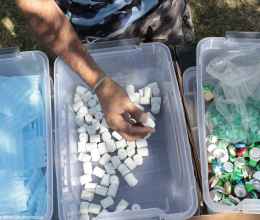She was just sleeping in her bed, I think to myself. Even when we are resting . . . we are not safe.
This past Wednesday, the announcement that the Louisville, KY police officers who shot and killed Breonna Taylor would not be charged for her death left a numb feeling in my stomach. News like this always hits hard, but gone are the days of expressed fear, disappointment or even rage. Nothing is more painful than the realization that the U.S. criminal legal system, a system heralded by historians and scholars as progressive, is not designed to protect those who do not reflect the Framers who created it: white, wealthy and male. Anyone outside of this image has faced centuries of genocide, enslavement, police violence, and forced hysterectomies — the grievances are endless.
Since the death of Trayvon Martin in 2012, I have witnessed this inexplicable wash, rinse and repeat cycle that Americans go through. First, we witness senseless deaths of Black, Brown and Indigenous men, women, and children at the hands of law enforcement. Then we are “shocked” and “outraged,” asking ourselves, How can this happen here? We demand justice and fairness from a system that is designed to protect property over the lives of people who used to be considered property in this country for 246 years. We ask for police reforms. Then we hear the news that another prosecutor will not press charges against those who take life without due process. We become numb. But then, we forget and we move on with our lives, while those who have lost their neighbors or loved ones are left holding nothing but a hashtag.
At its root, policing is designed to uphold systems of oppression, whether that be on the basis of race, wealth, disability, gender and/or sexuality. Over the summer, we have witnessed the pervasive racism that continues to plague our criminal legal system. We must reimagine our system of police violence and mistrust and replace it with alternative, civilian-led services that ensure public safety. The struggle to shift our dependency on policing is not new. We must honor the work of abolition activists like Angela Y. Davis and Ruth Wilson Gilmore and their creation of Critical Resistance to educate those willing to listen about the implications of the prison industrial complex and calls for the divestment in the militarization of our police departments. For years, mostly Black activists have called for investment in our communities with services to support those who are unhoused, dealing with addiction and/or experiencing a mental health crisis. Calls that have grown even louder during a pandemic.
At some point, we have to say enough is enough and build a new vision of safety, one that keeps all our neighbors safe from state-sanctioned violence, and not expand the role and power of police departments. A vision that allows the Elijah McClains to walk to a nearby convenience store to buy a sweet beverage, even when wearing headphones and hoodie, and allows the Breonna Taylors to lay in their beds at night after a long day at work with thoughts that they have time to realize the life goals and dreams.
At the ACLU of Colorado, it is our mission to protect and defend the lives of everyone in this state. Part of this mission includes educating our supporters about what is at stake when we continue to watch systems operate like it’s business as usual. As part of our response to this current moment of reckoning, we invite you to join us for a three-part webinar series to discuss the origins of policing and why calls for reform are not enough to eliminate discriminatory enforcement practices. Learn why we must redirect resources away from draconian police departments and toward services that are responsive to addressing our neighbors’ needs. Together, we can demand revolutionary change from our local officials that promotes community safety without dependence on law enforcement.
If you would like to participate, please register at People Power.
There was a time in our history where people could never imagine a world without chattel slavery. Yet here we are. Unfortunately, we have replaced that despicable system for other cruel systems: mass incarceration, predatory lending, and the school-to-prison pipeline, to name a few. It’s okay to have hope for a better future. But it’s going to take more than hope to reimagine a world that will keep my loved ones and your loved ones alive, safe and well. It’s okay to demand revolutionary change to make that happen. Because Black Lives Matter. My son’s life matters. Your mom’s and dad’s, brother’s, sister’s, and neighbors’ lives matter. Join us to lift up those fighting for a new vision of safety for everyone.
- Jessica Howard, ACLU of Colorado Racial Justice Campaign Coordinator

